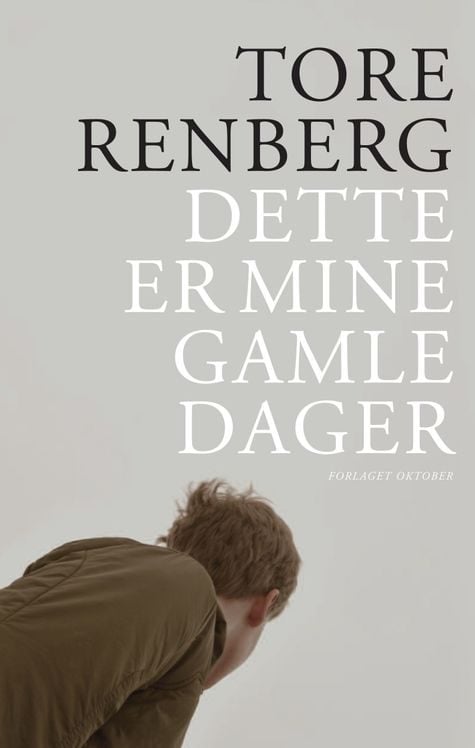“This book must be read as fiction, exactly the same as Knausgård’s. Consequently, we are left with the question: is this literary treatment of the father’s alcohol consumption and the son’s thoughts about it, good? Yes, not only good, but also crystal clear and distressing and the author has introduced a twist towards the end which gives the title a double meaning and moves me deeply … this is a writer in full control who has produced a book of painful intensity, unavoidable discomfort, but with compassion.”
(Aftenposten)
“The book’s rendition of Jarle’s thoughts sheds a ray of light on his innermost desires … intensely and passionately described, but nevertheless with a certain distance, and all the time with this symbolism of light/darkness which fills the entire novel … Although the dialogues are fewer than before, the reader follows the record of Jarle’s thoughts with heart in mouth. It helps that Renberg continually inserts striking images … and the descriptions of Jarle’s little son and daughter are particularly moving.”
(Morgenbladet)
“There is something truly Ibsenesque about these questions, and Renberg writes about important matters … when Jarle is taken by surprise and caught unawares, we are too. Then we laugh, we cry, we believe, and the pages disappear quickly … Renberg seems immersed in a disarming stillness, a sense of reconciliation and gentleness that is infectious … convincing honesty about the emotions that pull us humans in different directions … these are good questions to delve into. – Really good … Renberg has set himself the task of writing a whole series of books about Jarle Klepp … I hope he keeps it up for a long time, for this is excellent.”
(Vårt land)
“Jarle the father’s recollections and almost therapeutic reflections of his own father’s fate, about holiday trips and mountain expeditions with him, and how these experiences have shaped him, possess both passion and pace, and I find them touching … Renberg is a smart writer with an awareness of the comic and the tragic.”
(Dagens Næringsliv)
“As in The Man Who Loved Yngve, Jarle is narrating in the first person, a device which creates an extra sense of intimacy and works very well … Renberg’s concentrated energy comes into its own most of all in wonderful passages which, in contrast to his fellow-writer Knausgård, truly pay homage to the many simple joys of family life … Renberg’s new novel is energetic and affectionate, containing excellent observations within a portrayal true to its period.”
(Dagsavisen)
“The big drums on the car stereo can be understood in this context as symbolic of a longing we all share to break the restrictions of our existence and go in search of the really big drums in life, wheresoever they now might be. It is the kind of exquisite image only Renberg can evoke.”
(NRK)
“The joy of reading a novel in which the author dares to touch upon the personal and intimate … The descriptions of the father’s alcohol misuse are recognisable from The Orheim Company but do not seem dated because Renberg gives the material a fresh perspective … Personally, I feel that Renberg goes further than Knausgård, because he dares to hold up a mirror to himself and explore his own inner demons … These honest and sensitive descriptions give the book authenticity and ensure that our reading of the first part becomes intense and personal.”
(Bergens Tidende)
“Heartfelt close-up characterisations … Renberg’s language is personal, familiar and gripping in its depiction of the relaxed pace of everyday life.”
(VG)
“Those of us who have followed Jarle Klepp from The Man who Loved Yngve, The Orheim Company, Charlotte Isabel Hansen and Pixley Mapogo always look forward to a new book about Jarle … I think Renberg has written a very good novel … He is good at decribing human relationships and emotions. He expresses himself skillfully, employs amusing and unusual comparisons and has an aptitude for details. The book is a heartwarming account of the relationship between parents and children and the difficulty of understanding each other. Jarle’s thoughts and feelings are universal and can apply to most people.”
(Oppland Arbeiderblad)
“This is an almost unbelievable and risky project Tore Rensberg has embarked upon … So far he has succeeded, according to the opinions of both readers and critics. In the way Tore Renberg develops this psychologically deeply probing backwards glance, it becomes an agonising, nuanced and extremely powerful description of destructive forces, which have obviously tormented his father … Renberg’s ability to expose the dramatic events that lie within Jarle’s subconscious is narrative technique of the first order … Gradually childhood and upbringing are summarised and transformed into an existential spring clean that really enthralls the reader … Intimacy, nuance, and a high degree of authenticity sustain These are My Old Days… In expectation of Karl Ove Knausgård’s final volume using the same technique, we can establish that My Struggle VI will have to be particularly well written in order to measure up to Tore Renberg’s latest. In my opinion, this book is definitely the best so far.”
6/6 (Tønsbergs Blad)

